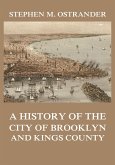In "Notes Geographical and Historical, Relating to the Town of Brooklyn in Kings County on Long-Island," Gabriel Furman meticulously chronicles the topographical and historical nuances of Brooklyn during the early 19th century. Employing a blend of descriptive narrative and analytical rigor, Furman's work serves as both a geographic report and a historical commentary, enriched by his keen observations on local culture and environment. This book reflects the growing interest in local history prevalent during his time, driven by burgeoning American nationalism and a thirst for regional identity. Gabriel Furman, a Brooklyn native and local historian, was deeply influenced by the rapid urbanization and demographic changes occurring in the area during his life. His intimate familiarity with Brooklyn's landscape, alongside his broader academic pursuits, informs his comprehensive approach to documenting the town's evolution. Furman's working relationship with local authorities and participation in civic matters further underscore his commitment to preserving Brooklyn's unique heritage, making his insights invaluable to understanding the community's past. "Notes Geographical and Historical" is an essential read for scholars and enthusiasts of American history and urban studies alike. Furman's analysis offers a rare window into pre-Civil War Brooklyn, making it indispensable for understanding the complex interplay between geography and historical development in this foundational American locale.
Dieser Download kann aus rechtlichen Gründen nur mit Rechnungsadresse in A, B, BG, CY, CZ, D, DK, EW, E, FIN, F, GR, H, IRL, I, LT, L, LR, M, NL, PL, P, R, S, SLO, SK ausgeliefert werden.









